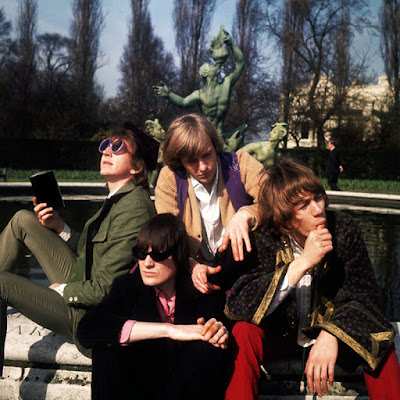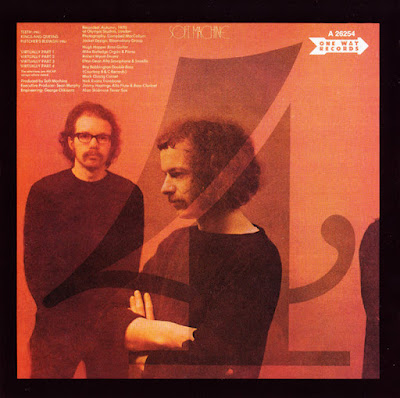MIKE RATLEDGE
Michael Roland Ratledge (6 May 1943 – 5 February 2025) was a British musician. A part of the Canterbury scene, he was a founding member of Soft Machine. He was the last founding member to
leave the group, doing so in 1976. Ratledge was born in Maidstone, Kent, the son of a Canterbury secondary modern school headmaster. As a child, he was educated in classical music, the only kind of music played in his parents' home. He learned to play the piano, and with his friend Brian Hopper, whom he had met at Simon Langton Grammar School for Boys in Canterbury, played classical piano and clarinet pieces.
SOFT MACHINE
SOFT MACHINE are an English rock band from Canterbury, Kent. The band were formed in
1966 by Mike Ratledge, Robert Wyatt, Kevin Ayers, Daevid Allen and Larry Nowlin. Soft Machine were central in the Canterbury scene; they became one of the first British psychedelic acts, and later moved into progressive and jazz rock. In 1971, Soft Machine became a purely instrumental band. Soft Machine's lineup has undergone many changes, and has included Andy Summers, Hugh Hopper, Elton Dean, John Marshall, Karl Jenkins, Roy Babbington and Allan Holdsworth.
Though they achieved little commercial success, critics consider Soft Machine to have been influential
in rock music. Dave Lynch at AllMusic called them "one of the most influential underground bands of their era". The band's name originates from William S. Burroughs's novel The Soft Machine.
THE SOFT MACHINE - VOLUME TWO 1969
The first Soft Machine LP usually got the attention, with its movable parts sleeve, as well as the presence of ultra-talented songwriter Kevin Ayers. But musically, Volume Two better conveys the
Dada-ist whimsy and powerful avant rock leanings of the band. Hugh Hopper took over for Ayers on bass, and his fuzz tones and experimental leanings supplanted Ayers' pop emphasis. The creative nucleus behind this most progressive of progressive rock albums, however, is Robert Wyatt. He provides the musical arrangements to Hopper's quirky ideas on the stream-of-consciousness collection of tunes ("Rivmic Melodies") on side one.
Unlike the first record, which sounded choppy and often somnolent, this one blends together better, and it has a livelier sound. The addition of session horn players enhanced the Softs' non-guitar lineup, and
keyboardist Mike Ratledge, whose musical erudition frequently clashed in the early days with the free-spirited Wyatt, Ayers, and Daevid Allen, lightened his touch here. He even contributes one of the album's highlights with "Pig" ("Virgins are boring/They should be grateful for the things they're ignoring"). But it's Wyatt who lifts this odd musical jewel to its artistic heights.
(By Peter Kurtz)
The Soft Machine – Volume Two
Label: Water – water196, Universal Music Special Markets – B0008536-02
Format: CD, Album, Reissue 2007
Country: US
Released:
Genre: Rock
Style: Psychedelic Rock, Prog Rock
TRACKS
RIVMIC MELODIES
01. Pataphysical Introduction Pt. I 1:00
02. A Concise British Alphabet Pt. I 0:10
03. Hibou, Anenome And Bear 5:59
04. A Concise British Alphabet Pt. II 0:11
05. Hulloder 0:54
06. Dada Was Here 3:25
07. Thank You Pierrot Lunaire 0:48
08. Have You Ever Bean Green? 1:19
09. Pataphysical Introduction Pt. II 0:51
10. Out Of Tunes 2:34
ESTHER'S NOSE JOB
11. As Long As He Lies Perfectly Still 2:34
12. Dedicated To You But You Weren't Listening 2:32
13. Fire Engine Passing With Bells Clanging 1:50
14. Pig 2:09
15. Orange Skin Food 1:47
16. A Door Opens And Closes 1:09
17. 10:30 Returns To The Bedroom 4:13
LINE - UP
Bass, Acoustic Guitar, Alto Saxophone – Hugh Hopper
Organ [Lowry, Hammond], Harpsichord, Piano, Flute – Mike Ratledge
Percussion, Drums, Vocals – Robert Wyatt
Soprano Saxophone, Tenor Saxophone – Brian Hopper
Written-By – Hopper (tracks: 2, 4 to 8, 10, 12, 17), Ratledge (tracks: 3, 10, 11, 13 to 17), Wyatt (tracks: 1 to 11, 17)
NOTES
Recorded in February/March 1969 at Olympic Sound Studios, London.
FLAC Size: 196 MB
THE SOFT MACHINE - FOURTH 1971
Soft Machine's collective skill is hyper-complex and refined, as they are extremely literate in all fields of musical study. Fourth is the band's free purging of all of that knowledge, woven into noisy, smoky
structures of sound. Their arcane rhythms have a stop-and-go mentality of their own that sounds incredibly fresh even though it is sonically steeped in soft and warm tones. Obviously there is a lot of skillful playing going on, as the mix of free jazz, straight-ahead jazz, and Gong-like psychedelia coalesces into a skronky plateau. Robert Wyatt's drumming is impeccable -- so perfect that it at times becomes an unnoticeable map upon which the bandmembers take their instinctive direction.
Mike Ratledge's keys are warm throughout, maintaining an earthy quality that keeps its eye on the
space between the ground and the heavens that Soft Machine attempt to inhabit. Elton Dean's saxophone work screams out the most inventive cadence, and since it's hardly rhythmic, it takes front and center, spitting out a crazy language. Certainly the band is the preface to a good portion of Chicago's post-rock output, as the Softs undoubtedly give a nod to Miles Davis' Bitches Brew experiments, which were going on in the U.S. at the same time.
Soft Machine – Fourth
Label: One Way Records – A 26254
Format: CD, Album, Reissue Oct 1995
Country: US
Released: 1971
Genre: Jazz, Rock
Style: Fusion, Jazz-Rock, Prog Rock
TRACKS
01. Teeth 9:12
02. Kings And Queens 5:02
03. Fletcher's Blemish 4:35
04. Virtually (Part 1) 5:17
05. Virtually (Part 2) 7:06
06. Virtually (Part 3) 4:33
07. Virtually (Part 4) 3:22
LINE - UP
Alto Flute, Bass Clarinet – Jimmy Hastings
Alto Saxophone, Saxello – Elton Dean
Bass – Hugh Hopper
Cornet – Mark Charig
Double Bass – Roy Babbington
Drums – Robert Wyatt
Organ, Piano – Mike Ratledge
Tenor Saxophone – Alan Skidmore
Trombone – Nick Evans
NOTES
Recorded in autumn, 1970 at Olympic Studios, London.
Flac Size: 231 MB
The Soft Macjine: The Soft Machine 1968 on Urban Aspirines HERE
The Soft Machine: Third 1970 on Urban Aspirines HERE


































